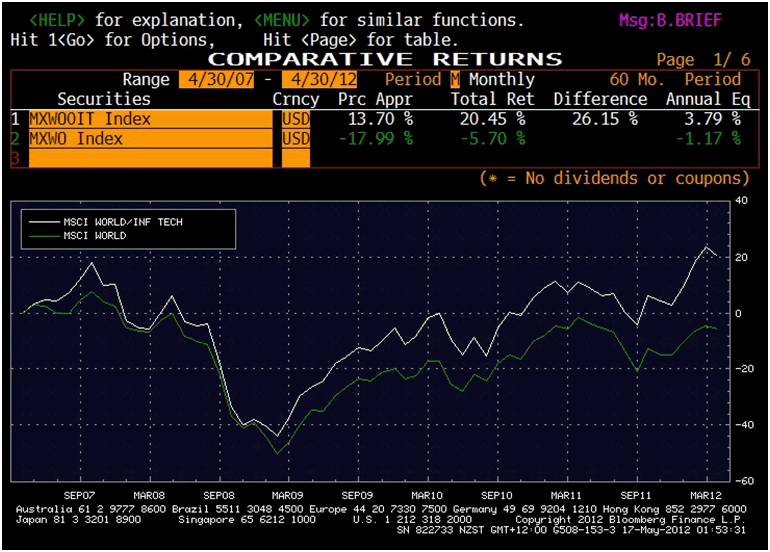Why You Shouldn’t Shun Tech Stocks
Companies / Tech Stocks May 25, 2012 - 03:07 AM GMTBy: Roger_Conrad

 Technology stocks have performed well during the past five years, especially in fast-growing emerging markets, where consumers have been forming lines around the block to snatch up iPads, smartphones and a host of other tantalizing devices.
Technology stocks have performed well during the past five years, especially in fast-growing emerging markets, where consumers have been forming lines around the block to snatch up iPads, smartphones and a host of other tantalizing devices.
The chart below tells the story. The technology sector has outperformed the MSCI World Index (MXWO) by 26 percent. The stage is set for this outperformance to continue, as demand accelerates this year throughout the global supply chain for computers, consumer gadgets, data storage, and information technology (IT) infrastructure.

Source: Bloomberg
IT spending will pick up this year, as companies become confident enough to make long-deferred investments in infrastructure and “the cloud.” Meanwhile, mobile devices and tablet computers are transitioning from niche products into the consumer mainstream.
Income-oriented investors looking for sustainable growth plays to add to their portfolios should consider technology stocks, which are not as risky and volatile as commonly thought. The key is to take a global perspective and search for the right companies.
In the US, technology stocks have consistently delivered some of the highest revenue and earnings per share growth rates. The sector has racked up more than 15 percent earnings growth during the past five years, compared to the broader market’s 2.5 percent. During the past ten years, growth for technology has been even higher, at almost 25 percent on a compounded annualized basis, compared to a little over 10 percent for the market.
If you think the tech bull run is over, think again. Long-term factors are in place that will allow technology to sustain these stellar growth rates. For starters, net tech investment in the US remains low, at around 0.3 percent of gross domestic product (GDP), while at the height of the 2000 technology bubble it was at 1.5 percent of GDP.
Despite the uncertain global economic backdrop, the US is likely to deliver GDP growth comfortably above 2 percent this year, historically the threshold above which investments in technology are made.
Technology is a big beneficiary of corporate spending. US corporations are flush with cash and eager to make IT investments that will improve efficiency and operations. Moreover, technology retail sales are very strong this year in the US, even though retail sales as a whole remain relatively weak.
Woe-begotten Europe is another matter, as the euro zone grapples with political crises and economic recession. However, Asia remains robust and tech exporters in the region are experiencing higher orders. Technology stocks in emerging markets will reap the benefits, as developing countries see incomes rise and tech prices decline.
Industry estimates put emerging market PC growth above 3 percent this year, while demand for other electronic devices is calculated at above 8 percent. The latter figure includes smartphones, a particularly strong growth area.
Smartphones in emerging markets are now at an attractive price point (e.g., USD150-200), generating strong consumer demand. The smartphone segment already represents about 20 percent of global technology sales, a figure that’s set to double over the next three years. Analysts estimate that by 2015, one billion smartphones will be in use around the world, up substantially from last year’s 472 million. Shipments of cheaper smartphones should increase to 400 million during the next three years.
Set to enter the market this year are new and more powerful “Ultrabooks,” as well as the Microsoft (NasdaqGS: MSFT) Windows 8 operating system and the Android 4.0. The latter is a promising development that unifies Android’s smartphone and tablet systems into a combined platform. Android tablets are expected to gain traction later this year, particularly in the 7” space and as a cheaper alternative to the iPad.
Amid all the exciting technologies coming to the fore, investors need to keep in mind that Microsoft still controls 81 percent of the market for operating systems. By far, the largest chunk of computer software is produced for the Windows platform.
Despite its growth characteristics, technology also serves as a defensive play. Technology is one of the most cash-rich and least indebted of all sectors.
LG Display is one of the leaders in the thin film transistor liquid crystal display (TFT-LCD) panel market with a 22 percent global market share. The company was established in September 1999 as a 50:50 joint venture between LG Electronics (London: LGLD) and Philips Electronics (NYSE: PHG). The company has been in turnaround mode, with all the ingredients to succeed. At current levels the shares are a good value. See my article, LG Display: On the Ropes But Still Slugging, for more analysis of the company.
By Yiannis G. Mostrous
Editor: Silk Road Investor, Growth Engines
http://www.growthengines.com
Yiannis G. Mostrous is an associate editor of Personal Finance . He's editor of The Silk Road Investor , a financial advisory devoted to explaining the most profitable facets of emerging global economies, and Growth Engines , a free e-zine that provides regular updates on global markets. He's also an author of The Silk Road To Riches: How You Can Profit By Investing In Asia's Newfound Prosperity .
© 2005-2022 http://www.MarketOracle.co.uk - The Market Oracle is a FREE Daily Financial Markets Analysis & Forecasting online publication.


